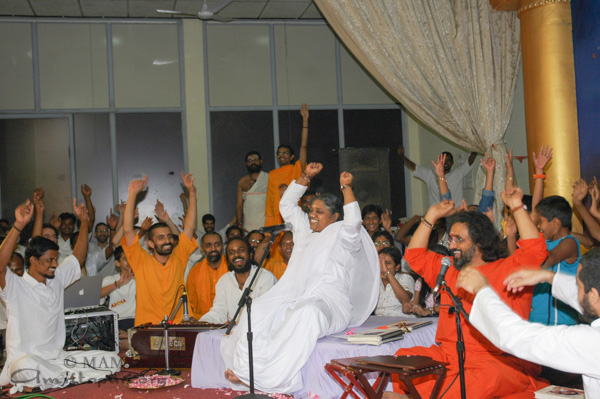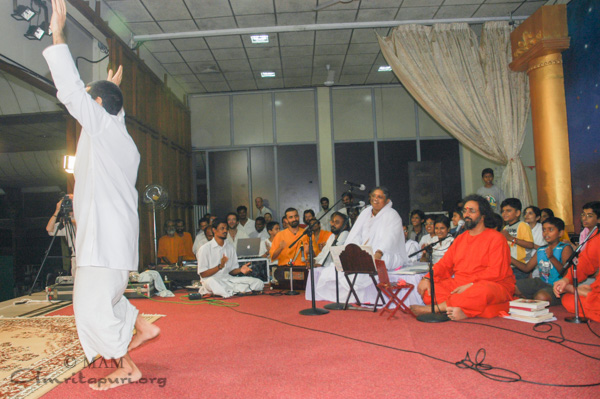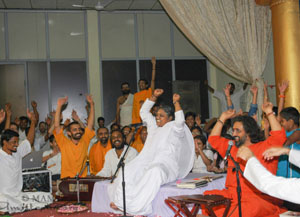Shivaratri Celebrations -16 February 2007 — Amritapuri

Sanatana Dharma has two types of festivals: festivals of rejoicing and festivals of austerity. Shivaratri is typically considered a festival of austerity—a night wherein food and sleep are forgone so that one can spend their time in remembrance of the divine. But with Amma, there are no black and whites. And who is to say austerity and rejoicing cannot go hand-in-hand?
It has been a long time since Amma has been in Amritapuri during Shivaratri. For the past 20 years, Amma has almost always been travelling as part of her Bharata Yatra during the festival. And Amma’s India Tour is nothing but Shivaratri after Shivaratri after Shivaratri—night after night of devotees and disciples trying to keep up with Amma as she gives darshan from dusk till dawn. As such, when Shivaratri proper comes around, not much is made of it.
This year Amma’s Bharata Yatra started a little later than usual, so the Shivaratri fell in between the first and second leg of the tour. On this auspicious night, the ashram residents assembled in the bhajan hall around 10:00 and began singing songs of Lord Shiva. It was only after a couple such songs that Amma came from her room to join everyone.
“How long is Shivaratri?” Amma asked everyone. Was Amma asking how long tradition dictates one stays physically awake on the holiday or was she asking how long her children were going to remember God?
Amma then began to lead everyone in bhajans dedicated to Lord Shiva. One of the bhajans Amma sang was “Prabhum Isham,” a very old song that Amma herself has not sung in many, many years.
After singing three or four songs about the Lord, Amma stopped and began talking about the significance of Shivaratri.
“How many days are there in one year?” Amma asked.
“365,” everyone replied.
“So, God is watching over you 365 days a year,” Amma said. “But Shivaratri is the one night wherein we are asked to sacrifice and watch over God, taking a vow of fasting and maintain vigil at night. God is always present within us—wide awake. We, on the other hand, are fast asleep. This is why we are unable to recognize the divine presence. All the different experiences of life are just like the dreams we experience in our sleep. If we really want to experience that divine presence, we need to forgo sleep as an act of renunciation for at least one day.”
“Food and sleep are the most important things to us. No one is ready to give them up just like that. Only when we develop a liking for remembering God will we be able to fast and forgo sleep without suffering.”
Amma then said that staying awake does not mean just merely keeping the eyes open, but means maintaining awareness of one’s thoughts, words and actions. “Ignorance disappears with the dawning of such awareness,” Amma said. “Darkness is not something that can be physically removed. But when we let in light, darkness automatically ceases to exist. In the same way, when true knowledge awakens, the darkness of ignorance disappears. Then we awaken to eternal light.”
Amma then related one of the Puranic stories from which comes the significance of staying awake all night on Shivaratri—the time the demons and the gods churned the ocean in order to obtain amrita [the nectar of immortality]. “When they did this, the first thing to come to the surface was a deadly poison,” Amma said. “It is said that Lord Shiva drank this poison in order to protect humanity from it. Here, the dreaded poison represents our prarabdha karmas 1. Lord Shiva, in the form of the Guru, accepts our prarabdha and protects us.”
Amma then told another element of the story, saying that in order to protect Lord Shiva from the poison, everyone around him maintained vigil throughout the night. Amma explained how when someone is bit by a snake, the doctor will force him to stay awake as to do so lessens the effect of the poison and can ultimately save his life.
“To prevent the snake-bite victim from falling asleep, his friends and family will sing and dance and pour water over his head,” Amma said. “They will also make him drink bitter medicines. Onlookers may feel sorry for the patient. They might even say, ‘Poor guy! Just let him close his eyes for a while! Why are you troubling him like this?’ But the doctor knows that if he is allowed to fall asleep that he may die.”
Amma said that the Guru is like this doctor. He will do anything and everything to keep us awake. We may not like it. He will make you drink bitter medicines in the form of experiences. But all this is done with the our higher good in mind—to awake us and keep us awake. Amma said that this is why people consider the guru their enemy.
“Unfortunately, many prefer to remain in darkness,” Amma said. “If God were to come before them and offer them liberation now itself, they would say, ‘Now, we want to watch TV. Will you please come later?’
Some of the devotees and disciples gathered for the holiday expressed disagreement, not wishing for Amma to think they considered her their enemy. Amma laughed and said, “We’ll see. Amma will test.” And then Amma snapped her fingers a few times, indicating how confident she was that they would consider her the enemy once she started her tests.
“Lord Shiva is the kaala-kaalan [कालकालन् the death of time],” Amma said. “This means that he removes the time-bound notions that ‘I was born, am growing and will die,’ and bestows the awareness of eternity.”
Amma then explained that people often turn towards God when they undergo a lot of hardship and sorrow in life. In those moments, they often come across the light of God. But to maintain this vision, we must maintain alertness,” Amma said.
Amma then explained the inner meaning to why Shiva’s eyes are always half-closed: “Even when mahatmas see the external world, their eyes remain focused on their True Self. They see the world verily as their Self. Their wisdom is clearly expressed in all their actions.”
Amma concluded by saying that Shivaratri also represents the marriage of Lord Shiva, the embodiment of knowledge, and Parvati Devi, the embodiment of pure love. “One attains completeness when knowledge and love come together. May my children’s hearts also become full of true knowledge and love. May my children be become the light of the entire world.”

When Amma finished her talk, it was almost 1:00 a.m. “What now?” Amma asked. Someone suggested that Amma should dance. But Amma had an idea of her own—the promised testing was bout to begin—”One of you should dance!” Amma said. Eventually, her eyes fell on one brahmachari from Kashmir—the land of Shaivism. He agreed. He rose to his feet, stood before Amma and offered his pranam. The music started: “Bolo Bolo Sabmilla Bolo Om Namah Shivaya.” For the next 20 minutes, Amma and the ashramites sang the ecstatic song in praise of Lord Shiva while the brahmachari offered his devotional dance to Amma—in front of 5,000 people. It seemed like Amma would sing the bhajan all night long. She just kept going and going, calling out louder and louder, raising the tempo faster and faster.
It was the middle of the night, but everyone in Amritapuri was wide awake—inside and out.
Was Shivaratri in Amritapuri a festival of austerity or of rejoicing?
—Kannadi
1 The results of our past actions that are destined to bear fruit in this life.

